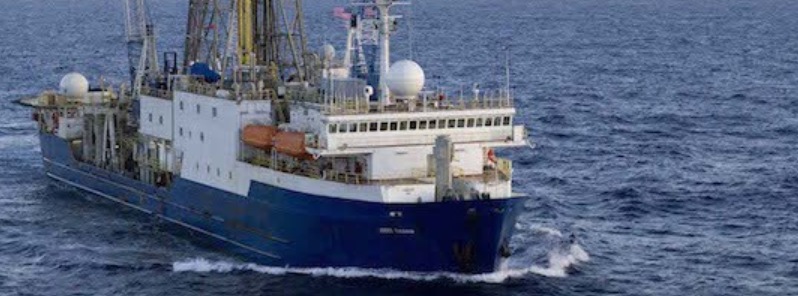Looking five million years into the past to predict Australia’s climate future

A group of leading international scientists are preparing to set sail on a two-month ocean expedition up the coast of Western Australia to drill deep into the seabed, on a mission to gain valuable insight into our climate future.
The $20 million International Ocean Discovery Program (IODP) Indonesian Throughflow Expedition 356, officially launched in Freemantle on July 30, is the first ever expedition to examine the climatic conditions of the past five million years off the western coast of Australia.
Currently, similar records of Australia’s climate history date back less than half a million years. This expedition aims to extend that record to an incredible five million years. With help from professional drill operators, the team will examine samples taken from drilling up to one kilometre beneath the seabed.
University of Melbourne palaeoceanographer Associate Professor Stephen Gallagher is a co-chief leading 125 international scientists and crew aboard the high-tech JOIDES Resolution research vessel, one of the world’s biggest floating scientific research facilities.
Three more scientists from the Australia and New Zealand IODP Consortium (ANZIC) will join the crew, made up of researchers from Norway, Austria, USA, Germany, Brazil, China, Sweden, Japan, the UK and the Netherlands.
“Knowledge of past global climate and oceanic systems is important if we are to understand how our present environment came to be and how it might change in future,” A/Prof Gallagher said.
“Our Southern Hemisphere location is vitally important in solving global science problems such a determining the history of the Indonesian Throughflow current, which is a key part of the global oceanic circulation system.
“The history of Australia’s climate is strongly linked to oceanic conditions off its coastline. Looking into the past history of these reef ecosystems and ocean currents will improve our understanding of how modern reefs and currents off west Australia may behave with future climate change.”
A/Prof Gallagher said the layers beneath the seabed contain rock and shells that give vital information about changing ancient environmental conditions, much like tree rings tell a story about the climate of a forest.
“We hope to find out when the present tropical oceanic conditions first appeared off western Australia so we can tell when the reefs developed. This may help us to predict how coral reefs and their tropical inhabitants will respond to possible future climate change.
“We really don’t know how long the present climate of the western half of Australia has persisted and how it has changed through various greenhouse and icehouse periods. We hope to understand Australian monsoonal behaviour during the last period in Earth's history, when CO2 levels were similar to today.”
Professor Neville Exon heads up the Australian office of the ANZIC consortium. He said these expeditions are vitally important to understand our planet.
“Oceans comprise 70 per cent of the Earth’s surface. The International Ocean Discovery Program’s studies of the sediments and rocks in the world’s oceans tackle the ‘big science’ questions like climate change, plate tectonics and geological hazards,” Prof Exon said.
“We will be really excited to see the results from the Indonesian Throughflow Expedition. We hope that we can answer some of the big questions about Australia’s climate past and future and will certainly find a few surprises along the way.”
The expedition departs from the Fremantle dock August 3 and will make its way up the West Australian coast to land in Darwin on October 1.
A team of communications officers and a professional photographer are onboard the JOIDES Resolution vessel for the duration of the expedition and will share updates on milestones and significant events on the journey via http://joidesresolution.org/blog, or via twitter.com/TheJR or instagram.com/joides_resolution/
Local school groups are encouraged to register to take part in video conferences with the scientists onboard. Go to Bit.do/JRexp356
Source: The University of Melbourne
Featured image: The Indonesian Throughflow Expedition will travel from Fremantle to Darwin on a mission to discover more about Australia's climate past and future. Credit: The University of Melbourne.

Commenting rules and guidelines
We value the thoughts and opinions of our readers and welcome healthy discussions on our website. In order to maintain a respectful and positive community, we ask that all commenters follow these rules.